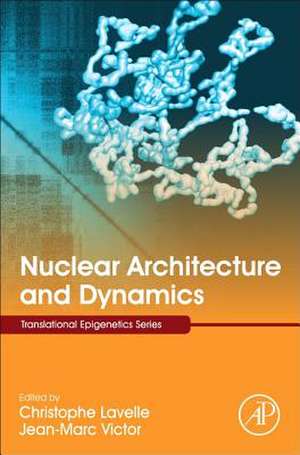Nuclear Architecture and Dynamics: Translational Epigenetics, cartea 2
Editat de Christophe Lavelle, Jean-Marc Victoren Limba Engleză Hardback – 20 oct 2017
The book provides the uninitiated with an entry point to a highly dynamic, but complex issue, and the expert with an opportunity to have a fresh look at the viewpoints advocated by researchers from different disciplines.
- Highlights the link between the (bio)chemistry and the (bio)physics of chromatin
- Deciphers the complex interplay between numerous biochemical factors at task in the nucleus and the physical state of chromatin
- Provides a collective view of the field by a large, diverse group of authors with both physics and biology backgrounds
Din seria Translational Epigenetics
- 18%
 Preț: 553.82 lei
Preț: 553.82 lei - 19%
 Preț: 659.12 lei
Preț: 659.12 lei - 23%
 Preț: 1206.43 lei
Preț: 1206.43 lei - 28%
 Preț: 915.82 lei
Preț: 915.82 lei - 24%
 Preț: 519.00 lei
Preț: 519.00 lei - 9%
 Preț: 783.84 lei
Preț: 783.84 lei - 23%
 Preț: 824.68 lei
Preț: 824.68 lei - 26%
 Preț: 949.33 lei
Preț: 949.33 lei - 27%
 Preț: 924.87 lei
Preț: 924.87 lei - 27%
 Preț: 804.68 lei
Preț: 804.68 lei - 27%
 Preț: 919.72 lei
Preț: 919.72 lei - 23%
 Preț: 918.41 lei
Preț: 918.41 lei - 28%
 Preț: 910.33 lei
Preț: 910.33 lei - 24%
 Preț: 956.09 lei
Preț: 956.09 lei - 26%
 Preț: 694.46 lei
Preț: 694.46 lei - 9%
 Preț: 1147.82 lei
Preț: 1147.82 lei - 27%
 Preț: 848.75 lei
Preț: 848.75 lei - 24%
 Preț: 846.30 lei
Preț: 846.30 lei - 22%
 Preț: 684.94 lei
Preț: 684.94 lei - 23%
 Preț: 794.89 lei
Preț: 794.89 lei - 24%
 Preț: 799.69 lei
Preț: 799.69 lei - 22%
 Preț: 940.43 lei
Preț: 940.43 lei - 9%
 Preț: 799.39 lei
Preț: 799.39 lei - 21%
 Preț: 942.98 lei
Preț: 942.98 lei - 25%
 Preț: 727.60 lei
Preț: 727.60 lei - 23%
 Preț: 810.69 lei
Preț: 810.69 lei - 23%
 Preț: 789.43 lei
Preț: 789.43 lei - 23%
 Preț: 791.73 lei
Preț: 791.73 lei - 23%
 Preț: 812.29 lei
Preț: 812.29 lei - 23%
 Preț: 803.71 lei
Preț: 803.71 lei - 27%
 Preț: 967.96 lei
Preț: 967.96 lei - 28%
 Preț: 703.10 lei
Preț: 703.10 lei - 25%
 Preț: 872.39 lei
Preț: 872.39 lei - 29%
 Preț: 827.81 lei
Preț: 827.81 lei - 20%
 Preț: 711.92 lei
Preț: 711.92 lei - 23%
 Preț: 729.96 lei
Preț: 729.96 lei - 23%
 Preț: 805.50 lei
Preț: 805.50 lei
Preț: 833.02 lei
Preț vechi: 1032.91 lei
-19% Nou
Puncte Express: 1250
Preț estimativ în valută:
159.39€ • 166.42$ • 131.92£
159.39€ • 166.42$ • 131.92£
Carte tipărită la comandă
Livrare economică 29 martie-12 aprilie
Preluare comenzi: 021 569.72.76
Specificații
ISBN-13: 9780128034804
ISBN-10: 0128034807
Pagini: 618
Dimensiuni: 191 x 235 x 36 mm
Editura: ELSEVIER SCIENCE
Seria Translational Epigenetics
ISBN-10: 0128034807
Pagini: 618
Dimensiuni: 191 x 235 x 36 mm
Editura: ELSEVIER SCIENCE
Seria Translational Epigenetics
Cuprins
PART I - CHROMATIN ORGANIZATION AND DYNAMICS
1. DNA mechanics
2. DNA supercoiling (omics)
3. Chromatin and chromosome folding (experiments)
4. Chromatin and chromosome folding (modeling)
5. Chromatin and chromosome physics
6. ncRNA in chromatin folding
7. Insulators
8. Condensins and cohesins
9. Long range interactions
10. Crowding
PART II - NUCLEAR ENVELOPE, NUCLEAR BODIES AND NUCLEOCYTOPLASMIC TRAFFICKING
11. Nuclear bodies
12. Nucleolus
13. Transcription factories
14. Polycomb bodies
15. Nuclear lamina
16. Other components of the nucleoskeleton
17. Nuclear pores
18. Nuclear traffic
PART III - MAIN NUCLEAR FUNCTIONS
19. Chromatin folding and DNA replication
20. Chromatin folding and DNA repair
21. Chromatin folding and transcription
22. Chromatin folding and recombination
23. Chromatin folding and differentiation
24. Nuclear mechanics and mechanotransduction
25. Altered nucleus and disease
PART IV - SPECIFIC FEATURES OF NUCLEAR ORGANIZATION IN MAIN MODEL ORGANISMS
26. Yeast nucleus
27. Nematode nucleus
28. Drosophila nucleus
29. Plant nucleus
Conclusion and perspectives by the editors
1. DNA mechanics
2. DNA supercoiling (omics)
3. Chromatin and chromosome folding (experiments)
4. Chromatin and chromosome folding (modeling)
5. Chromatin and chromosome physics
6. ncRNA in chromatin folding
7. Insulators
8. Condensins and cohesins
9. Long range interactions
10. Crowding
PART II - NUCLEAR ENVELOPE, NUCLEAR BODIES AND NUCLEOCYTOPLASMIC TRAFFICKING
11. Nuclear bodies
12. Nucleolus
13. Transcription factories
14. Polycomb bodies
15. Nuclear lamina
16. Other components of the nucleoskeleton
17. Nuclear pores
18. Nuclear traffic
PART III - MAIN NUCLEAR FUNCTIONS
19. Chromatin folding and DNA replication
20. Chromatin folding and DNA repair
21. Chromatin folding and transcription
22. Chromatin folding and recombination
23. Chromatin folding and differentiation
24. Nuclear mechanics and mechanotransduction
25. Altered nucleus and disease
PART IV - SPECIFIC FEATURES OF NUCLEAR ORGANIZATION IN MAIN MODEL ORGANISMS
26. Yeast nucleus
27. Nematode nucleus
28. Drosophila nucleus
29. Plant nucleus
Conclusion and perspectives by the editors
